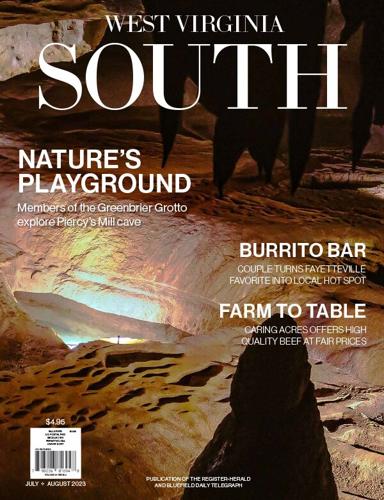CHARLESTON — Details were released recently for the first-ever Governor’s School for Tourism, a 10-day summer academy for students interested …
Plans for the Piney Creek Gorge in Beckley, including a potential overlook and visitor center, were discussed Tuesday at a Beckley Common Coun…
SAN FRANCISCO--(BUSINESS WIRE)--Apr 25, 2024--
LONDON--(BUSINESS WIRE)--Apr 25, 2024--
AUSTIN, Texas (AP) — With graduations looming, student protesters doubled down early Thursday on their discontent of the Israel-Hamas war on c…
SLOUGH, United Kingdom and RICHMOND, Va., April 25, 2024 /PRNewswire/ -- Indivior PLC (LSE/Nasdaq: INDV) today announced its financial results…
Asian shares are mostly lower as investors look ahead to a flood of global earnings reports, including from U.S. companies known as the “Magni…
Asian shares are mostly lower as investors look ahead to a flood of global earnings reports, including from U.S. companies known as the “Magni…
Germany said Wednesday that it plans to follow several other countries in resuming cooperation with the U.N. relief agency for Palestinians in…
morgantown, w.va. – A partnership between federal and state entities will support high-speed internet deployment to rural West Virginia commun…
Five military horses spooked by noise from a building site have bolted during routine exercises near Buckingham Palace in central London and r…
washington, d.c. – The Appalachian Regional Commission (ARC) announced Wednesday the 90 local government entities, representing 12 Appalachian…
Sports
Premium Text Ads
Obituaries
86, of Princeton. Service 11 a.m. Friday, April 26, at Seaver Funeral Home, Princeton. Burial at Oakwood Park Cemetery, Princeton.
Special Publications
National News
LONDON--(BUSINESS WIRE)--Apr 25, 2024--
AUSTIN, Texas (AP) — With graduations looming, student protesters doubled down early Thursda…
Asian shares are mostly lower as investors look ahead to a flood of global earnings reports, including from U.S. companies known as the “Magnificent Seven.” Shares fell Thursday in Tokyo and Seoul, while being little changed in Shanghai. Trading was closed in Australia for a national holiday, Anzac Day. U.S. stocks drifted to a mixed finish, with the S&P 500 closing little changed. The Dow Jones Industrial Average fell 0.1%, and the Nasdaq composite edged up 0.1%. Tesla, one of the Magnificent Seven companies, jumped after saying it would accelerate production of more affordable vehicles.
Spicy, steaming, slurpy, ramen might be everyone’s favorite Japanese food. In Tokyo, there are lines around the block, and the ramen is often cooked right before your eyes behind dingy counters. Ramen also has become more popular around the world. Retail sales in the U.S. have risen 72% since 2000. One of ramen's appeals is its variety. You can go with salty, soy sauces or spicy chili. Sometimes there's no soup, just a sauce to dip the noodles in. And there are all kinds of toppings. Ramen is as loved in Japan as the more expensive sushi and Kobe beef.
Columbia University President Minouche Shafik's leadership is under fire. She has been criticized for her recent testimony to Congress over growing concerns about antisemitism on college campuses — and her handling of subsequent on-campus protests. More than 100 protesters at Columbia were arrested last week after Shafik asked New York City police to clear a pro-Palestinian encampment. The move did little to stop new protests from springing back up at Columbia and on campuses nationwide. University faculty have filed a motion of censure against her, and a number of state and House Republicans have begun calling for her resignation.
TOKYO (AP) — Ramen noodles are so popular they have become one reason to visit Japan. But ra…
The U.S. Supreme Court is considering another abortion-related case while a repeal of Arizona's abortion ban has picked up steam. Meanwhile, California's governor has opened his state not only to Arizona patients seeking abortion but also their Arizona-based doctors. Those are among this week's developments that could shape abortion policy in the U.S. as it continues to shift in the aftermath of the Supreme Court's 2022 decision to undo a national right to abortion. States continue to diverge on the issue. Blue states like California are trying new ways to protect abortion access, and red ones like Idaho are trying to curtail it.























































Commented
Sorry, there are no recent results for popular commented articles.